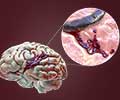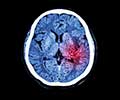Researchers have pinpointed the cause of a serious brain bleeding condition in premature newborns, linking it to how immature neurons respond to oxygen levels.

Intraventricular haemorrhage in premature infants: the role of immature neuronal salt and water transport
Go to source). The study reveals insights that could lead to new treatments for a serious brain bleeding condition that’s common in newborns with very low birth weight. The findings are published in Brain.
‘Discovering the root of serious #brainbleeding in premature #newborns, researchers unveil a pivotal link to how immature neurons respond to oxygen levels. #lowbirthweight ’





“Intraventricular hemorrhage, which is characterized by bleeding inside or around the spaces in the brain that contain the cerebral spinal fluid, occurs in about one-third of newborns with very low birth weight, and more than half of survivors are neurologically handicapped for life,” said senior author Kevin J. Staley, MD, who is chief of the Division of Pediatric Neurology at Massachusetts General Hospital. “The pathophysiology of brain injury leading to intraventricular hemorrhage in prematurely born infants is unclear—therefore, providing effective intervention is challenging.” Research from animal models suggests that brain tissue shrinkage, with subsequent stretching of blood vessels, is an important step in the pathophysiology of intraventricular hemorrhage, but the cause of this shrinkage is unknown.
Staley and his colleagues conducted experiments in mice to reveal that certain salt and water transporters located in the cell membranes of neurons play a role in this tissue shrinkage in response to a lack of oxygen to the brain. Altering the activity of these transporters prevented neuronal shrinkage and blood vessel stretching after brain injury in immature neurons.
“We found that because of the unique salt and water transport systems expressed in immature neurons, the neurons shrink in response to injury. This is the opposite of the reaction to injury in the mature brain, which swells after injury. The volume loss in immature neurons leads to local tissue shrinkage that then stretches blood vessels, which can lead to rupture and intraventricular hemorrhage,” Staley explained. “We demonstrated using animal models that manipulation of the transporters will ameliorate these consequences of brain injury.”
Next, the scientists will analyze clinical data to assess whether their experimental findings in mice apply to human newborns.
Advertisement
- Intraventricular haemorrhage in premature infants: the role of immature neuronal salt and water transport - (https://academic.oup.com/brain/advance-article-abstract/doi/10.1093/brain/awae161/7685424?redirectedFrom=fulltext)
Source-Eurekalert















